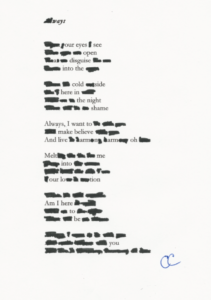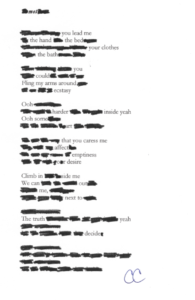
pass words
what unknown secrets govern our
screens & our identities, the desire
to know each other’s desire
supersedes the knowledge of our own
i’ve forgotten what i am again
& how, locked out
keyless & clueless which
digits might make me
enter my machine & head
home, placed
the camera pulled
rudely acquiesced a kind
of absolute beauty, did you
get the annual report
unopened e-mails unanswered
questions classified
based on subject & sender
primary/social/promotions
case of harassment when
you see something as a strap
hanger standing above
so many brooklyn rushing by
in dirty faded windows pre
cautious reminder do not
lean on doors
whatever did i guess
my password mistakes me
for security questions
i can’t recall or think
i lied to begin with how
i want to live without & from within
only what i have to give which can be
very often nothing sting
singing don’t stand so close to me
as i text you, i want to
make believe i can only
picture your avatar projected
something secured
in my jeans front
pocket uncomfortably close
in another stranger’s
ears i pass words
to you on the tip
of my tongue in you in your own
ear & mouth i wish
to be you
Proximity to the victim,except victim is in double quotes, a fever-sweet witness and shared. I sit at the broken-off counter drinking filth, neatly and with no ice alloy ally of migration in the park dimensional drown, having a harbinger of something I can hardly guess at or use a bot to write this down on a beach somewhere else for our warm mechanical attention and the risk of inconvenience. Puppy eyes and insistence and the pin-prick of my existence shimmering. Imagine all the escaped moments of loving kindness after sixty soft minutes alone in the lavatory to think calmly, another luxury modernity bestows upon the best or the most willing bodies. Pry apart your parched lips for a long list of financials, zoomed in with a digit toward an escalating PDF and let it catch up to you in proximity to the victim. Divided by gender and sectioned by class, race, and ethnicity, sad tigers growing sadder testimonies so I am digging for dollars, all kinds of currency and loved ones in my pocket, quick as a month or minute rapid. Rehabilitated in the gaze of my camera turned backward so I might see myself in the act, spotty, split, reeling icons into a figure of god, extracted of capital, a finger grazing a knuckle, a palm being splayed on the counter drinking filth, neatly and with a continuum of exemptions, like: No women aged 35-50 or: A required distance of 3.5 miles. Proximity to the victim what search results or algorithms pucker against my softened voice or spilled drink, wayward particles of light escape vintage or virtuosity by the simple fact of my being. Proximity to the victim is irrelevant when you are the victim.

Chris Campanioni’s new book is Death of Art (C&R Press, 2016). His “Billboards” poem responding to Latino stereotypes and mutable—and often muted—identity in the fashion world was awarded an Academy of American Poets Prize and his novel Going Down was selected as Best First Book at the 2014 International Latino Book Awards. He edits PANK, At Large, and Tupelo Quarterly and lives in Brooklyn, where he teaches literature and creative writing at Pace University and Baruch College.
BACK
NEXT
